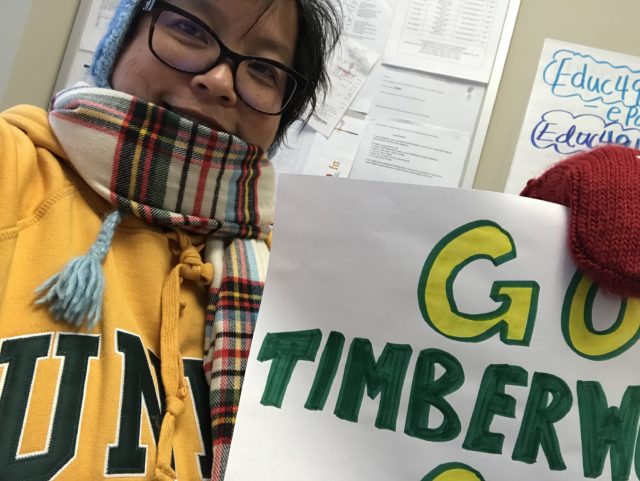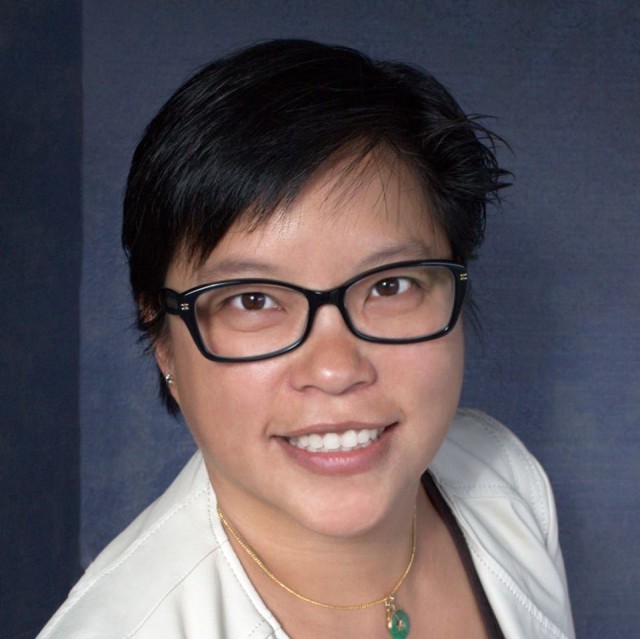Day 41 (of 187) – October 31, 2018

Happy Halloween… Yes, I’m an UNBC Timberwolves FAN!!! Thank you for noticing. That said, I am listening to the fireworks in my neighbourhood of College Heights in Prince George where I am “laying low” on this Halloween night. It the first night in 15 years that I’m not at home in Sechelt on the Sunshine Coast with my daughter where she would like to dress up, hang out with friends, and give out candy. I’m here… miles away living in an apartment building. NO ONE is coming by my place to “trick or treat” and that’s OK.
It does not take much to make my day. I did have candy to give out to my class today. The student presenters brought candy too. We had gummies, licorice, and chocolate. A winning combination… especially when my students just finished a midterm exam in a previous class and I’m recovering from my fall from yesterday. Why not soothe the soul with a bit of candy? To top it off, today’s reading summary was about FORMATIVE ASSESSMENT and Assessment for Learning… one of my favourite topics to discuss and do in education but also one of the key underpinnings of BC’s New Curriculum.
Lots of thoughts go through my mind as my students present a summary of the article and facilitate a learning activity based on that article. The article focused much about policies and systems, and how the framework of formative assessment should be found throughout the system to support and enhance student learning. It was a big article, meaning that it wasn’t focussed on the details of how to implement specific formative assessment strategies, but it revealed many of the big ideas of formative assessment and its value to student learning and quality of teaching. At the end of the presentation… “I tried” to clarify some ideas about assessment and what to expect in some of my course assignments, but I think I made it worse. I did not seize the formative opportunities.
One of the underpinnings of my course is EXPERIENTIAL LEARNING. I was so compelled to “tell the answer” and I did. I think what I said only made sense to those who had already completed the assignment. I did not honour experiential learning cycle and allowing students to struggle. Well, I did with those who had already completed the assignment but there are still those who still need to complete the assignment. Nonetheless, all was said and done and we had only 10 minutes to get into our collaborative learning groups to design an interdisciplinary unit plan and lesson plan.
After a couple of meetings and carbo-loading with a Tim Horton’s bagel (and some yummy cake), I returned to my office to pack up. I sat there for some moments to “catch my breath” and appreciate my surroundings. I needed to regroup. What was great was… one of my students popped his head in my door and cheered. I think that he was glad I was still here. It was getting late. There were two students… and yes, they were asking for some help. FORMATIVE ASSESSMENT and FORMATIVE FEEDBACK. I could not have asked for anything more. With some discussion, I hopped out of my seat to talk about the learning intentions and the assignment. YEEEESSSS!!! Formative in REAL-TIME. Students engaged in the struggle… and the AH-HA… for ME and my students. Love the formative.
 Wow. It does not take much to trigger me. “Is it me?” A classic question that NO ONE wants to answer. I appreciate that someone is willing to speak to someone face-to-face and inquire if the problem is him or her. Unfortunately, you’re NEVER going to hear the answer that would reflect the truth. So why ask? Is there another way to ask the question? NO ONE is going to say the problem is YOU. That’s just a fact. How can we get around this issue in an educational system that desires and hopes for vulnerability? As you can see, one question provokes me to ask many other questions. It makes me curious.
Wow. It does not take much to trigger me. “Is it me?” A classic question that NO ONE wants to answer. I appreciate that someone is willing to speak to someone face-to-face and inquire if the problem is him or her. Unfortunately, you’re NEVER going to hear the answer that would reflect the truth. So why ask? Is there another way to ask the question? NO ONE is going to say the problem is YOU. That’s just a fact. How can we get around this issue in an educational system that desires and hopes for vulnerability? As you can see, one question provokes me to ask many other questions. It makes me curious.
I just spoke with a student who was faced with this situation. “Is it me?” This student could not confirm or deny that the problem was the teacher. Why would this student do so anyway? Horrifying. If the roles were reversed, we would never say that the problem in our classroom is the student. We would say it’s his/her behaviour, actions, or mindset… SOMETHING THAT YOU CAN CHANGE. It’s a strange phenomenon in education that I question. How can we have a more vulnerable education system that encourages more formative feedback amongst stakeholders to leverage learning when all those involved are somewhat defensive, politically paranoid, or easily hurt? We end up “functioning” in a edu-vacuum where not much is said except for pleasantries and workplace politeness.
Formative feedback is NOT PERSONAL. It should reflect your performance and competencies. Not only should it reflect these attributes, but also should provide you with what to strive for and how to get there. In fact, receiving formative feedback is in your best interest… to be come a better YOU… and those who are providing feedback provide an expertise and want YOU to be a better you. They have your best interest in mind. Formative feedback is about helping each other and the information shared benefits both the evaluator and recipient. It goes beyond collective efficacy… formative feedback is more like COLLECTIVE WINNING. The mantra would be, “we’re in this together.”
But no… “Is it me?” sets people apart… to an US vs. THEM scenario. The power differential is in full play and of course, the subordinate in this relationship would naturally concede and say… “no, no, no… it’s me.” Unbelievable… and in the end, NOTHING CHANGES. There is no opportunity for “real” formative feedback and an opportunity to get better, be better, or make the situation better. All that this scenario perpetuates is the status quo… and if it’s not good??? It remains NOT GOOD. Is this an educational model that we can tolerate? Apparently, the answer is yes. This is disheartening. Education is ALL ABOUT RELATIONSHIPS. It’s fragile and resilient at the same time. We need to be asking the right questions. We are the creators of what we see. So, what do you see?
We are constantly immersed in the formative. From the viewpoint of the teacher, are your students engaged, empowered, and passionate about what they are learning? Or are your students disengaged, on their phones, and indifferent? Maybe they are somewhere in between… but guess what? You are creating that behaviour. This is the challenge of teaching. It’s complex and dynamic. There is never THE SAME at any one moment in time… nor should we strive for that. We are not hoping for robot-like students who are homogenous in their thinking or doing. We want to nourish their competencies, strengths, and interests. How do we create a love for learning for all stakeholders? Wouldn’t it be great to develop passionate learners instead of compliant consumers? This is my hope.
The worst part about this question, “Is it me?,” is asking the same question to self. “Is it me?” Self-assessment and self-reflection are integral to the teaching/learning/leading process and when we question self inappropriately or inaccurately because we are functioning in a vacuous silo, then this is when it goes wrong and ugly. How can someone take ownership of something when they don’t know if it’s them or not? It’s a poor assumption. Similarly, one cannot take ownership for something when no one is talking formatively or if one is confronted with “Is it YOU?” No one is winning. Nothing and no one gets “better.” And yes, the status quo persists. Are we really learning in education?
Let’s end this edu-rant with a bit of research. According to John Hattie’s (2016) updated results… factors with the greatest effect size on student learning include feedback (0.73), teacher clarity (0.75), and teacher credibility (0.90). Teacher credibility ranked NUMBER ONE. Do not underestimate the power of the teacher and your influence on student learning. Student looks up to the teacher. It’s important to be a role model but also provide feedback and clarity. It can’t be “Is it me?” anymore. This message goes to all levels in education. We are in this together. It has to be, “It is WE.” Think formative.
Written by Christine Ho Younghusband, March 12th, 2018 | Comments Off on Is it me?
Filed under: Uncategorized | Tags: assessment, collective efficacy, education, effect size, formative, formative feedback, Hattie, leverage learning, reflection, research, student learning, vulnerability

 Wow. It does not take much to trigger me. “Is it me?” A classic question that NO ONE wants to answer. I appreciate that someone is willing to speak to someone face-to-face and inquire if the problem is him or her. Unfortunately, you’re NEVER going to hear the answer that would reflect the truth. So why ask? Is there another way to ask the question? NO ONE is going to say the problem is YOU. That’s just a fact. How can we get around this issue in an educational system that desires and hopes for vulnerability? As you can see, one question provokes me to ask many other questions. It makes me curious.
Wow. It does not take much to trigger me. “Is it me?” A classic question that NO ONE wants to answer. I appreciate that someone is willing to speak to someone face-to-face and inquire if the problem is him or her. Unfortunately, you’re NEVER going to hear the answer that would reflect the truth. So why ask? Is there another way to ask the question? NO ONE is going to say the problem is YOU. That’s just a fact. How can we get around this issue in an educational system that desires and hopes for vulnerability? As you can see, one question provokes me to ask many other questions. It makes me curious.